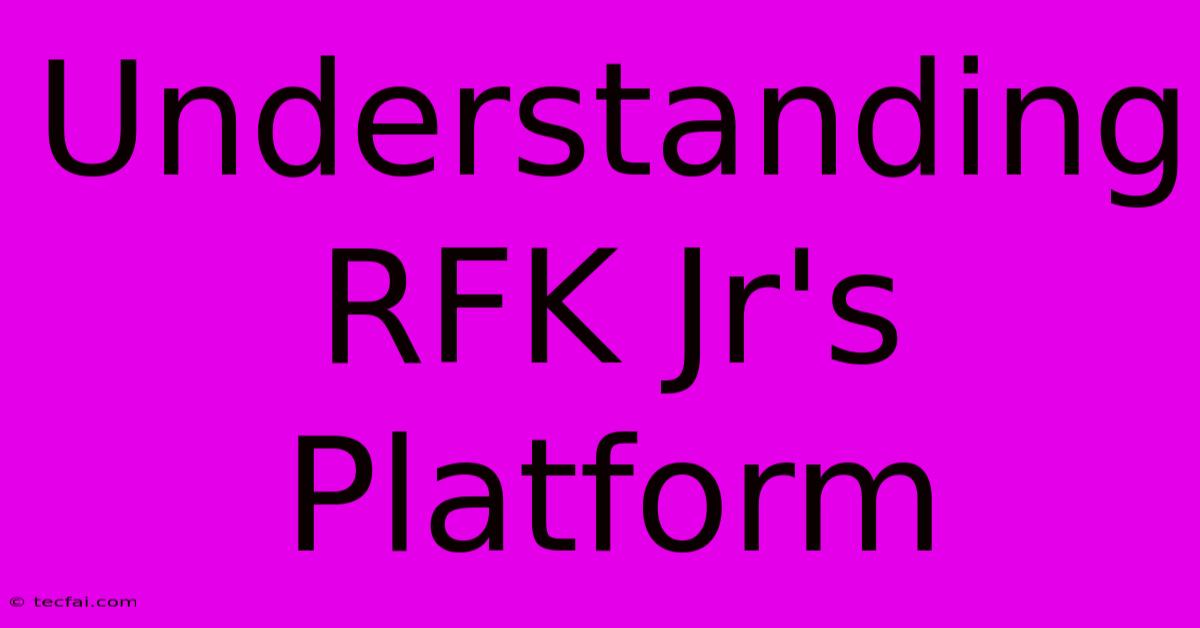Understanding RFK Jr's Platform

Discover more detailed and exciting information on our website. Click the link below to start your adventure: Visit Best Website tecfai.com. Don't miss out!
Table of Contents
Understanding RFK Jr.'s Platform: A Deep Dive into His Political Stances
Robert F. Kennedy Jr.'s 2024 presidential campaign has ignited significant interest and debate. Beyond the name recognition, understanding his platform requires looking beyond the headlines and examining his detailed policy proposals. This article delves into the key tenets of his political platform, exploring his positions on various issues and analyzing their potential impact.
Key Pillars of RFK Jr.'s Platform:
RFK Jr.'s campaign focuses on several core themes, often presented as a departure from mainstream political discourse. These include:
-
Ending the "forever wars": A central tenet of his platform is a strong anti-interventionist stance on foreign policy. He advocates for ending US military involvement in protracted conflicts and prioritizing diplomatic solutions. This includes a sharp criticism of the war in Ukraine and a call for reduced military spending.
-
Combating corporate power and corruption: Kennedy consistently highlights the undue influence of large corporations and wealthy elites on government policy. He emphasizes campaign finance reform, increased regulation of corporate power, and a focus on addressing wealth inequality. His rhetoric often paints a picture of a system rigged against the average citizen.
-
Protecting the environment: Environmental protection forms a significant part of his platform. He advocates for policies promoting clean energy, tackling climate change, and protecting natural resources. However, his approach sometimes differs from traditional environmentalist viewpoints.
-
Promoting healthcare reform: Kennedy is a vocal critic of the current US healthcare system. He calls for expanding access to healthcare, lowering costs, and promoting alternative medicine alongside conventional treatments. He's specifically critical of pharmaceutical industry influence on healthcare policy.
-
Addressing the opioid crisis: This is another key area of focus. His proposals often center around addressing the root causes of addiction, expanding access to treatment, and holding pharmaceutical companies accountable for their role in the crisis.
Controversial Aspects and Criticisms:
While his platform resonates with some voters, several aspects have drawn significant criticism:
-
Vaccine skepticism: Kennedy's long-standing skepticism towards vaccines, particularly mandatory vaccination programs, is perhaps his most controversial position. This has been widely criticized by public health experts, who cite the scientific consensus on vaccine safety and efficacy.
-
Conspiracy theories: Accusations of promoting conspiracy theories, particularly regarding the COVID-19 pandemic and the 2020 election, have significantly impacted his public image and credibility. These accusations have led to concerns about his fitness for office.
Analyzing the Potential Impact:
The impact of RFK Jr.'s platform, if implemented, would likely be far-reaching and potentially disruptive. His proposals on foreign policy could lead to significant shifts in US international relations. His economic policies might trigger substantial debates about the role of government regulation and the balance between economic growth and social justice. His healthcare proposals could reshape the US healthcare system, potentially creating both benefits and drawbacks depending on their specific implementation.
Conclusion:
Understanding RFK Jr.'s platform requires a nuanced approach. While his proposals on issues like environmental protection and healthcare reform resonate with many, his controversial stances on vaccines and his association with conspiracy theories raise serious concerns. His campaign presents a unique blend of populist appeal and unconventional policy ideas, sparking important discussions about the future of American politics. It's crucial for voters to critically analyze all facets of his platform before forming an opinion, considering both the potential benefits and drawbacks of his proposed policies. The ongoing discussion surrounding his candidacy underscores the complexity and dynamism of the current political landscape.

Thank you for visiting our website wich cover about Understanding RFK Jr's Platform. We hope the information provided has been useful to you. Feel free to contact us if you have any questions or need further assistance. See you next time and dont miss to bookmark.
Featured Posts
-
1st T20 I Highlights Australia Vs Pakistan
Nov 15, 2024
-
Wordle Answer And Hint November 15 2024
Nov 15, 2024
-
Tate Mc Raes Miss Possessive Tour 2025 World Tour
Nov 15, 2024
-
Uefa Nations League Live Stream Greece Vs Opponent
Nov 15, 2024
-
Uk Snow Risk Arctic Blast Arrives
Nov 15, 2024
